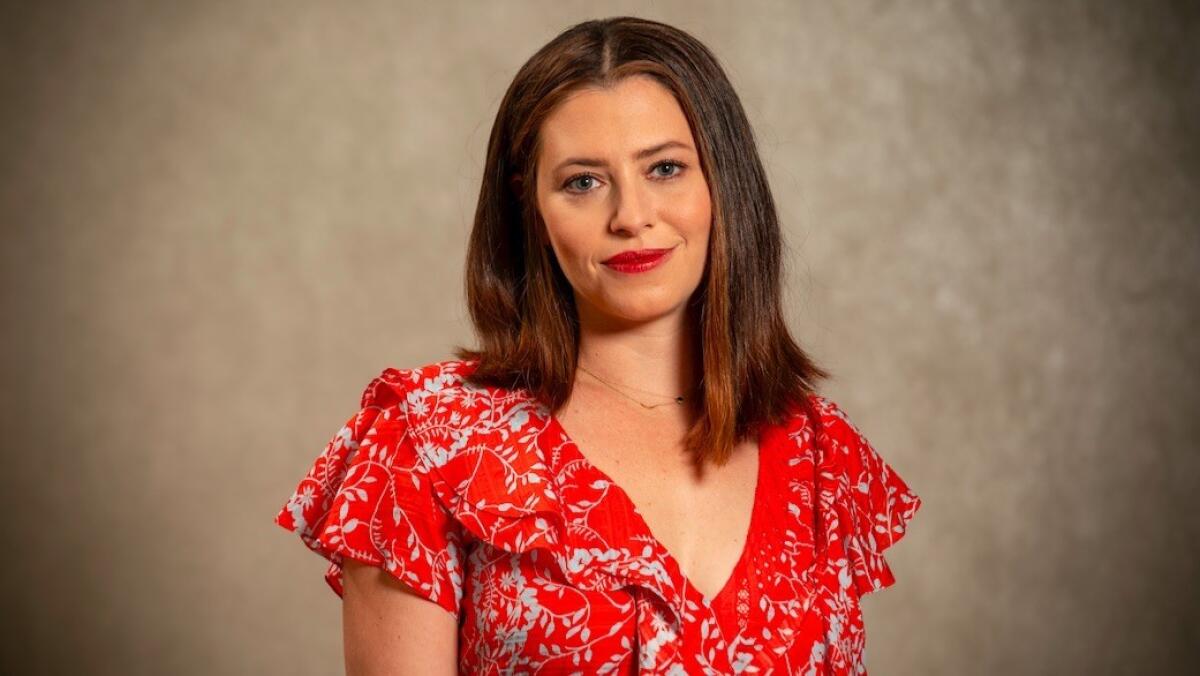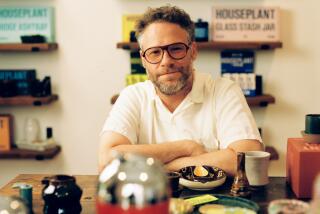How Lauren Miller Rogen channeled the pain of family tragedy into her directorial debut, ‘Like Father’

It felt like everything was finally happening. After years of struggling to land acting roles in Hollywood, Lauren Miller Rogen was one of the leads of a big movie — a movie she had co-written, no less — “For a Good Time, Call …” The raunchy comedy had sold to Focus Features in a $2-million deal at the 2012 Sundance Film Festival, and everyone wanted to meet with Rogen. She was going on high-profile auditions, meeting with producers about scripts.
“Meanwhile, I’m breaking inside,” she recalled. “It was like everything I’d ever wanted was happening, and yet my mom was getting sicker and sicker with Alzheimer’s and disappearing in a very painful way.”
Rogen’s mother, Adele, developed early-onset Alzheimer’s when she was just 55. Her daughter has been public about her family’s struggle, putting on an annual celebrity-filled variety show, Hilarity for Charity, with her husband, Seth Rogen, to raise money for Alzheimer’s research.
But by the time “For A Good Time, Call…” was released, Adele was about five years into her diagnosis, and her condition had deteriorated rapidly. No longer was she just repeating stories — she had been admitted to the hospital for a seizure just days before the release of Lauren’s new film.
Rogen was so distressed by the situation, she said, that she developed “silver dollar-sized acne” on her back. She’d snap at anything — she was “at a 10 at all times.” She even got into a few minor car wrecks.
So she decided to get into therapy. And six years later, at 37, she’s gathered enough perspective on the situation to channel her experience into a new film, “Like Father.” On the surface, the movie — which was released on Netflix last Friday — doesn’t mirror Rogen’s life at all.
It follows a workaholic executive (Kristen Bell) who is so obsessed with her job that she carries her cellphone down the aisle at her wedding, where she is then promptly left at the altar by her fed-up fiancé. In a drunken stupor, she decides to bring her estranged father (Kelsey Grammer) on her Royal Caribbean honeymoon cruise instead.
The idea behind the film wasn’t hers — it came from Anders Bard, one of the producers behind 2009’s “I Love You, Man.” Bard mentioned the project to Rogen at a general meeting, noting that he already had a writer working on the screenplay.
“I was like, ‘I love it. I wanna write it,’” Rogen said of the conversation. “And he was like, ‘You’re not hearing me, someone else is already writing it.’ And I just stayed on him for a few months and my agent stayed on him.”
Rogen was sitting at Froma, a small wine cafe on Melrose Avenue, a few blocks away from where she and her husband live in West Hollywood. It was here that — long after agreeing to let her take a stab at the script — Bard gave Rogen the greenlight to make “Like Father” her directorial debut.
“As the producer, building a project with a first-time director is incredibly challenging,” Bard acknowledged. “And five years ago, there was much less of a narrative of supporting female filmmakers. So we laughed: ‘OK, we’re about to make our lives really hard.’ And it was — but boy, am I happy we didn’t waver.”
Indeed, the pair found that no studios were interested in signing onto a first-time filmmaker’s movie without big names attached. Rogen kept saying she needed a distributor’s help in finding those stars, and eventually Netflix agreed to be that partner.
Throughout the process, Rogen herself questioned why she was so passionate about this particular film. Sure, the screenplay told the story of a woman on an emotional journey — but what was it about the project that she couldn’t let go of?
“It wasn’t until after we shot and I was in the editing room that I realized: It was a woman who thought she had it all going, and all of a sudden, not so fast,” she said. “And until she deals with it, she can’t get to the other side.”
Rogen has always been close to her parents. When she was 8, her family made the move from Long Island to Lakeland, Fla., after her dad, the manager of a manufacturing plant, switched positions within his company. At first, she felt like “the new Jewish kid” in a Florida town where “the Chamber of Commerce said ‘Churches: 300, Jewish Churches: 1.’”
Eventually she found her place at a local arts high school, and after graduation she decided to study fashion design at New York’s Fashion Institute of Technology. There, she modeled her clothes after designer Nanette Lepore — “lots of ruffles and pleats and layers.” But she wasn’t happy sitting at a sewing machine.
So one day, on a whim, she decided to try her hand at acting … sort of. She’d seen a flyer at school advertising a film production looking for extras. It was “Shaft,” the 2000 reboot starring Samuel L. Jackson.
“You can see my torso walk by in one scene,” Rogen said with a laugh. “As silly as it sounds, those three days being on set, I was like, ‘I wanna be an extra forever!’ They did your hair and makeup and wardrobe. At the time, it felt beyond special.”
Her parents, however, were less than thrilled with her new career direction. Instead of staying in New York to audition, her father suggested she transfer to film school. Rogen wanted to go to NYU, far away from all of the kids she’d gone to high school with, but Florida State University was far more affordable.
“I went to Florida State kicking and screaming,” Rogen said, rolling her eyes at herself. “And can I tell you, within the first 10 minutes of being there I was like, ‘Here I am. These are my people.’”
She became so close with her classmates that two years later, when the program was finished, the group of aspiring filmmakers caravaned across the country to move to L.A. together. Rogen scanned the UTA job list and landed a couple of internships, later becoming the assistant to producer Steve Starkey, one of Robert Zemeckis’ partners.
In her free time she would work on screenplays, and even landed an agent. She also started dating a new guy — the one who would eventually become her husband — after the two met at a party one night. Four months into their relationship, “The 40-Year-Old Virgin” was released and the actor’s career took off.
“He was so much further along than I was, but it’s always been easy with Seth,” Rogen said. “Honestly, I think the fact that we do the same thing is a blessing. The only time I was ever frustrated was when he wouldn’t respond to something fast enough, because he’s really casual. But that doesn’t happen anymore.”
The couple is low-key about the relationship -- Seth even has a role in “Like Father,” playing a guy Bell hooks up with on the cruise. You wouldn’t know the connection from his Twitter feed, where he casually posted this message last Friday: “I’m in a movie called “Like Father” out now on Netflix! I think you will enjoy it if you watch it. Thank you!”
In the 13 years they’ve been together, he’s become an advocate for people with Alzheimer’s, even testifying in front of Congress in 2014 to advocate for research financing. And together, the couple moved Rogen’s parents from Florida to L.A. so she could be closer to them.
Adele hasn’t been communicative for four years, and her daughter said she’s “gotten to a place of acceptance and knowing what I can handle — how much time I can be over there.” At first, she found it difficult to sit by her mother’s bedside and talk endlessly, only to be greeted by silence. Things eased as soon as she began reading to her mother.
“She always loved Danielle Steel novels, so those are a favorite,” said Rogen. “The funniest part of the books is that they’re really steamy and I’m like, ‘Should I read this to her? She doesn’t know. All right!’”
Because Alzheimer’s is so prevalent within her own family, Rogen is proactive about her health. She goes to an Alzheimer’s prevention clinic in New York for brain assessments, and tries to eat foods that are good for her: sardines, blueberries, walnuts, curcumin.
Rogen’s frankness about her mother’s struggles has long impressed her friends, including “For a Good Time, Call …” costar Ari Graynor, who said the actress would often be “completely open with what she was dealing with personally and then seamlessly transition to a conference call as a fierce and fearless leader.”
“Lauren was, and has always been, incredibly honest about her experiences centered around her mom’s health,” Graynor continued. “I don’t think anyone could do for Alzheimer’s what she’s done from a place of denial. Lauren is in possession of what I think is the greatest superpower: strength and vulnerability in equal measure. She has incredible fortitude matched only by the openness of her heart. Which not only makes her a beautiful person, but someone destined to be a great director.”
Follow me on Twitter @AmyKinLA
More to Read
Only good movies
Get the Indie Focus newsletter, Mark Olsen's weekly guide to the world of cinema.
You may occasionally receive promotional content from the Los Angeles Times.











